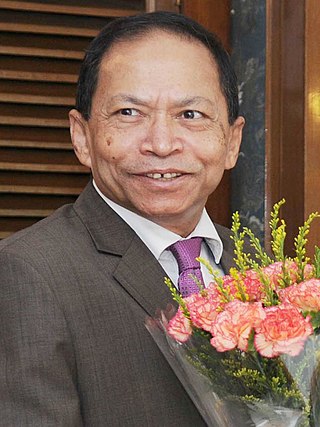Related Research Articles

Supreme Court of Bangladesh is the highest court of law in Bangladesh. It is composed of the High Court Division and the Appellate Division, and was created by Part VI Chapter I of the Constitution of Bangladesh adopted in 1972. This is also the office of the Chief Justice, Appellate Division Justices, and High Court Division Justices of Bangladesh. As of August 2024, there are 6 Justices in Appellate Division and 78 Justices in High Court Division.

Ali Ahsan Mohammad Mojaheed was a Bangladeshi politician who served as a Member of Parliament and as the Minister of Social Welfare from 2001 to 2007. He was executed in 2015 for war crimes committed during the 1971 Liberation war of Bangladesh.

Bangladesh Jamaat-e-Islami, previously known as Jamaat-e-Islami Bangladesh, is the largest Islamist political party in Bangladesh.

Mir Quasem Ali was a Bangladeshi philanthropist and a politician of the Jamaat-e-Islami party. He was a former director of Islami Bank and chairman of the Diganta Media Corporation, which owns Diganta TV. He founded the Ibn Sina Trust and was a key figure in the establishment of the NGO Rabita al-Alam al-Islami. He was sentenced to death on 2 November 2014 for crimes against humanity committed during the Liberation War of Bangladesh in 1971 by International Crimes Tribunal of Bangladesh.

Surendra Kumar Sinha, commonly known as SK Sinha is a Bangladeshi lawyer and jurist who served as the 21st Chief Justice of Bangladesh. He resigned from the position in November 2017 amid the 16th amendment verdict controversy.

The Judiciary of Bangladesh or Judicial system of Bangladesh is based on the Constitution and the laws are enacted by the legislature and interpreted by the higher courts. Bangladesh Supreme Court is the highest court of Bangladesh. The jurisdiction of the Supreme Court of Bangladesh has been described in Article 94(1) of the Constitution of Bangladesh. It consists of two divisions, the High Court Division and the Appellate Division. These two divisions of the Supreme Court have separate jurisdictions.
Haji Mohammad Salim is a Bangladesh Awami League politician and a former Jatiya Sangsad member representing the Dhaka-7 and Dhaka-8 constituencies.
Shazneen Tasnim Rahman murder was the rape and murder of Shazneen Tasnim Rahman in Dhaka, Bangladesh which became a "sensational" case.
Jahangir Hossain a retired judge of the Appellate Division of Bangladesh Supreme Court.

Syed Refaat Ahmed is a Bangladeshi lawyer and jurist who is the current and 25th chief justice of Bangladesh. Before that he was elevated to the Appellate Division and President of Bangladesh appointed him as the chief justice. Previously he was a judge at the High Court Division of the Supreme Court of Bangladesh.
Obaidul Hassan is a jurist who briefly served as the chief justice of the Supreme Court of Bangladesh. He was appointed as the chief justice on 12 September 2023 and served as 24th Chief justice of Bangladesh. He also served as the president of the Inquiry Committee, 2022 for the formation of Bangladesh Election Commission. He was forced to resign as Chief Justice in the aftermath of the Student–People's uprising.
M Enayetur Rahim is a retired justice on the Appellate Division of Bangladesh Supreme Court. Earlier, he was justice of the High Court Division, Bangladesh Supreme Court. He also served as the chairman of the International Crimes Tribunal 1. He is the president of the Bangladesh Judicial Service Commission.
Md. Miftah Uddin Choudhury is a judge on the High Court Division of Bangladesh Supreme Court.
Md. Ashfaqul Islam is a judge of the Appellate Division, Supreme Court of Bangladesh.
Sardar Md. Rashed Jahangir is a Justice of the High Court Division of the Bangladesh Supreme Court.
Shahed Nuruddin is a Justice of the High Court Division of the Bangladesh Supreme Court. He was the trial judge in the 2004 Dhaka grenade attack case.
Abdus Salam Mamun is a Justice of the High Court Division of the Bangladesh Supreme Court.
Sheikh Rezowan Ali is a retired justice of the High Court Division of the Bangladesh Supreme Court.
Justice Mir Hasmat Ali is a retired Justice of the High Court Division of the Bangladesh Supreme Court.
Mohammad Gholam Rabbani was a judge of the Appellate Division of Bangladesh Supreme Court.
References
- ↑ Saha, Gour Gopal (2008-10-08). "Durga Puja: Its religious and social meaning". The Daily Star. Retrieved 2023-08-28.
- ↑ "Mandatory registration of Hindu marriage stressed". The Daily Star. 2012-12-23. Retrieved 2023-08-28.
- ↑ "Birth anniversary of Ramakrishna today". The Daily Star. 2008-03-09. Retrieved 2023-08-28.
- ↑ "Law & Our Rights". www.thedailystar.net. Retrieved 2023-08-28.
- 1 2 "Termination of 84 election officers illegal". The Daily Star. 2010-04-13. Retrieved 2023-08-28.
- 1 2 "Law and Our Rights". archive.thedailystar.net. Retrieved 2023-08-28.
- 1 2 "CJ puts 2 crore Hindus in dock: Hindu Welfare Trust". New Age. Retrieved 2023-08-28.
- 1 2 "Justice Gour Gopal Saha passes away". The Daily Star. 2018-09-04. Retrieved 2023-08-28.
- ↑ "ACRP stresses for global peace through inter-religious harmony". bdnews24.com. Retrieved 2023-08-28.